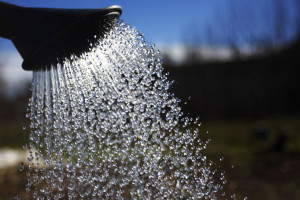The Catalan tradition on the Sant Jordi’s Day is giving a rose. Taking this special date, we suggest some tips for watering your roses, and so keep them well maintained throughout the year.
The first months of rosebush
During the first year of planting, lack of water is, in many cases, the cause of a rosebush fail. So watering during this stage is the key. Because during the first months, the roots are still shallow, and need to absorb more water to develop.
To learn how to water our rosebush properly, we must consider the type of soil in which we will plant it. If for example there is a sandy soil, the rose bush will not retain water very well, and will need more frequency and amount of watering, especially at first. If instead it is a clay soil, it will hold moisture longer and will need less water.
Watering the rosebush depending on season
As with most plants during summer times, it is important to moisturize the rosebush. With the heat and drought, plants need more water and more frequently. In areas of excessively hot weather, it is recommended to water the rose bush once every day. In areas of more moderate heat is sufficient watering every two or three days.
Generally it is important to water them early in the morning or in the evening, but never during the hours of more heat and sunshine.
During the winter, the rose tree has no leaves and therefore do not need to water it frequently. Except that it still young or you’ve planted in pots. In the latter case, it is recommended to water it regularly so that the roots do not dry out.
¿Hose or watering can?

Tips for watering a rose bush
You can use both, it depends on your comfort and the garden space you have available. If you use the watering can, it is advisable to use with artichoke-shaped neck, as the water will not come in a single stream. In this way you won’t erode the soil from the roots. In the case of using the hose, it is important to avoid high pressure jet.
In both cases it is essential not to wet leaves or flowers, and apply irrigation on the foot of the plant. You should also try never swamping the rose bush because they can rot the roots. Yellow and falls leaves are a sign of rotten roots.
If in addition to these tips, you provide your rosebush with water of high quality and without chlorine, you guarantee healthier roots. In order to manage this, you can make use of water filtration systems, which remove 99% of chlorine, Herbicides, Pesticides and Volatile Organic contaminants. This way you will guarantee success and health for your rose bush and the other plants in your garden, and very convenient, because the filters include connectors for external taps.


